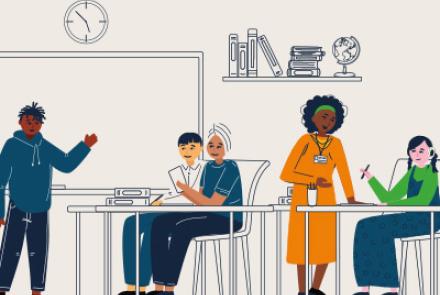Mental health - a picture of need in schools
Mental health provision in mainstream secondary schools
This type of provision varies across schools, but it is becoming increasingly common for schools to have trained Emotional Literacy Support Assistants for pupils with a Social Emotional and Mental Health need (SEMH). Many schools also provide lunchtime and break time clubs for those who find the social times at school more difficult to navigate.
Schools may also have Mental Health First Aiders, ‘Thrive’ practitioners, counsellors, and a range of interventions for pupils with SEMH needs, such as drawing and talking, Lego therapy and social skills clubs.
However, in my experience, it is unusual to find an intervention or specialist specifically for autistic pupils. They do exist but usually involve a ‘buy-in’ whether that be from specialist teams from the local authority or providing training to upskill staff.
The increasing need for mental health and wellbeing support for autistic pupils
There is an increasing need for mental health services, which are often overwhelmed, meaning pupils face a long wait to access the help they need. In the meantime, schools must resort to supporting these pupils with limited provision in place.
According to Autistica 7 in 10 autistic young people have an SEMH need. This, coupled with the rise in autistic young people being excluded from mainstream school, demonstrates the urgent need for both pupils and staff in schools to understand how to support autistic pupils with their mental health and wellbeing.
How does Autistic and OK help?
The free programme provides a ready-to-use toolkit for secondary schools. Teaching staff can use the toolkit resources to help autistic pupils understand and look after their own mental health and wellbeing.
The programme works in several innovative ways:
- The programme is designed to be peer-led. Older autistic pupils (in years 10 and above) will take on the Peer Facilitator role and deliver sessions on mental health topics to their younger peers. They will be supported by school staff to deliver these sessions.
- The Autistic and OK resources are ready-made and good to go! The resources, outcomes and even the classroom set-up for each session are fully explained so staff and Peer Facilitators can feel confident in the delivery.
- There is a whole-school element to the programme. One of the resources is an assembly session, which can alternatively be delivered in tutor time. This session is designed to promote more accepting attitudes towards autistic pupils across the wider school community.
- There is a training module to enable staff to build their knowledge on autism related to mental health and understand how to support autistic pupils in their school setting.
- Lastly, there is a range of resources to support parents or carers of autistic pupils.
The pilot programme
The Autistic and OK programme was piloted in 19 secondary schools across the country. I acted as a SENCo consultant to some of the schools taking part in this pilot and was able to provide valuable feedback from these schools to the programme team.
A selection of feedback about the positive impact of the programme from the pilot schools:
"The resources are great, ready to use and straightforward."
"The pupils and the member of staff taking part have found the programme really positive."
"It has been fantastic to see the realisation by some that they are not ‘weird’, it is just that their brains work differently and that is OK."
"Some of those who took part in the programme did not know each other before have become friends and spend social time together."
Find out more about the Autistic and OK programme.
About the author
May MacKay-Morris is the lead consultant at Senco Services. May advised the programme team at Ambitious about Autism throughout the development of Autistic and OK.












